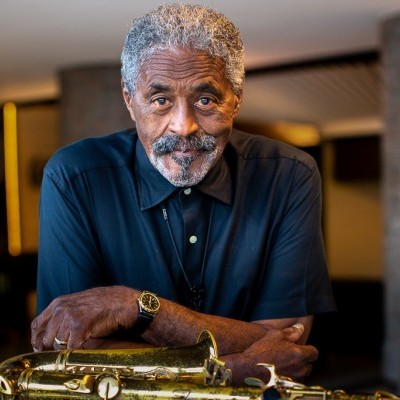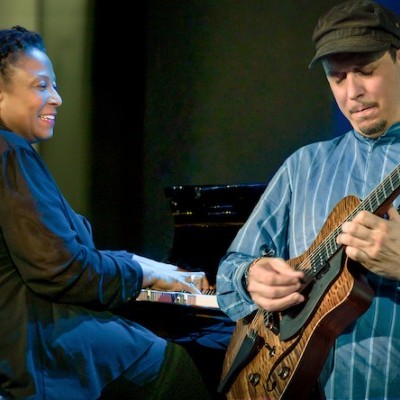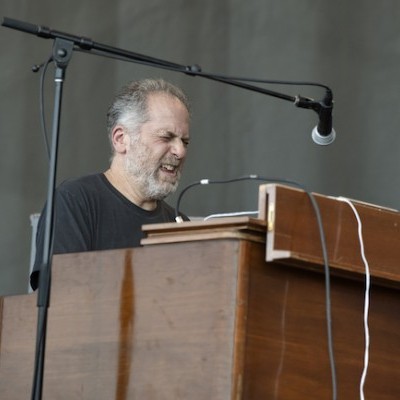Apr 2, 2024 12:59 PM
Saxophonist, Sonic Explorer Casey Benjamin Dies at 45
Casey Benjamin, the alto saxophonist, vocalist, keyboardist and producer who stamped his distinctive sounds on the…
Mulgrew Miller
(Photo: )Pianist Mulgrew Miller, a major figure of the post-bop era and dedicated jazz educator, died on May 29 in Allentown, Pa., from a stroke. He was 57.
Miller’s one-of-a-kind technique helped establish him as an in-demand sideman and heavily documented pianist. His playing can be heard on hundreds of albums by artists such as Joe Lovano, Kenny Garrett and Kenny Barron. His most recent projects included the live album San Sebastian (In + Out) with bassist Ron Carter’s Golden Striker Trio.
Miller could swing hard but maintained grace and precision with a touch and facility that influenced generations of musicians. Though he was a force to be reckoned with on the bandstand, both in stature and talent, his gentle nature and ability to mold students became major factors in his role at William Paterson University, where he served as director of jazz studies since 2005.
Miller was born in Greenwood, Miss., on Aug. 13, 1955. At an early age, he immersed himself in the varied musical culture of the South, listening to blues, country & western, gospel, r&b and European classical music. By age 6, he was picking out melodies by ear on the piano, and at 8 began lessons. His musical experience was limited initially to soul cover bands and the church organ. But when Miller heard Oscar Peterson—which Miller described as “life-changing”—he shifted his focus toward mastering jazz.
Miller further developed as a jazz musician while attending Memphis State University, where he befriended fellow pianists James Williams and Donald Brown. Williams and Brown introduced him to a repertory of greats, including Bud Powell, Wynton Kelly and McCoy Tyner. He also became intrigued by Eastern spiritual practices, which he absorbed through Ray Charles sideman Rudolph Johnson. These combined influences, along with the philosophies of the civil rights movement, were instrumental in shaping Miller’s trademark technique—cautious and attentive, yet soulful and rhythmic.
It was a sound that would later surface in more than 400 recordings and within several all-star groups. At age 20, Miller joined the Mercer Ellington Orchestra and eventually played with Art Blakey’s Jazz Messengers, Betty Carter and the Woody Shaw Quintet. He was also one of the founding members of Tony Williams’ acclaimed quintet, with which he played from the mid-1980s until the drummer’s death in 1997. That same year, Miller also toured with the 10-pianist group 100 Golden Fingers, featuring Barron, Tommy Flanagan and Ray Bryant, and later joined the Contemporary Piano Ensemble.
As adept a sideman as he was a frontman, Miller released his first recording as a leader in 1985 on producer Orrin Keepnews’ now-defunct label, Landmark Records. He performed predominantly in trio and quintet configurations, as well as his own Wingspan sextet, and released a string of leader recordings on RCA/Novus.
Miller’s innate desire to see young musicians succeed was a fundamental part of his character. Along with mentoring student musicians at William Paterson University, he made an impact on the emerging wave of twenty- and thirty-something musicians today, such as Karriem Riggins and bassist Derrick Hodge, who joined Miller’s most recent groups.
Keyboardist Robert Glasper paid homage to Miller in his ballad “One For ’Grew,” and pianist Geoffrey Keezer claimed that “seeing Mulgrew play solo piano in Greenwich Village in the late 1980s, when I was in my teens, is what made me decide to be a professional musician.”
Hodge, who performed with Miller on Live At Kennedy Center Volume 1 And 2 in 2006 and 2007, talked about the pianist’s impact:
“Mulgrew was such an incredible being aside from his musical legacy, which will live with us forever. I don’t know if I could say enough about his spirit, his attitude, so many things about being a leader and being a man and the way you treat people, and how that breathes into your music—so much of it I learned from him. I owe a lot of the way I’d like to be to him, and I feel so honored that I was actually able to tell him that.
I remember when I first met Mulgrew. Bootsie Barnes, a legendary musician from Philadelphia, put in a really good word for me, and Mulgrew drove down in the middle of the night to a small club in Philly just to hear me play. I couldn’t believe it. I met him at the break and thanked him, and he said, ‘Whenever you have time, just come to the house and we’ll play a couple tunes.’ I showed up the following weekend in a suit and cologne because his wife was home [laughs]. He always joked with me forever about that. We played a couple tunes, he asked me to join his group, and I said, ‘Without question.’
I was rushed into a fire. All of the sudden, my first gigs were at the Vanguard with Ron Carter and Russell Malone showing up. When I think [about it] in hindsight, just the person that Mulgrew was, for him to be willing to give a young person a chance like that, and allow me the opportunity to pass or fail… that is a testament to who he was. How he chose to give people his life experience and let them craft their own …. He’d do it with dignity and pride, and expect the most from them, but give them a chance to develop. I thank God for his spirit and everything he’s done for me.”
William Paterson University Coordinator of Jazz Studies David Demsey also offered a statement on Miller:
“I’ve lost a great friend, a warm and caring person, a world-class gentleman and a close colleague who was a true partner in leading the William Paterson University jazz program for the past eight years. Although Mulgrew is so widely respected as a player and is recognized worldwide as one of the most influential pianists on the scene, most people might not realize what a dedicated, passionate teacher he was. There was a real ‘love affair’ between him and our students, and their musicianship shows that.
Each of the times I had the opportunity to perform with Mulgrew were life-changing, but I also learned a great deal from watching him as a teacher and mentor to our students. He had become a master at balancing his performing with his teaching and was truly there for them each and every week. His main load each semester was directing six of our 24 small jazz groups; in those daily teaching situations, his stellar career accomplishments and his towering stature as a pianist were set aside as he was all about helping that student, that ensemble group to grow at that moment.”
Miller is survived by his wife, Tanya; his son, Darnell; his daughter, Leilani; and one grandchild.
—Hilary Brown

Benjamin possessed a fluid, round sound on the alto saxophone, and he was often most recognizable by the layers of electronic effects that he put onto the instrument.
Apr 2, 2024 12:59 PM
Casey Benjamin, the alto saxophonist, vocalist, keyboardist and producer who stamped his distinctive sounds on the…

“He’s constructing intelligent musical sentences that connect seamlessly, which is the most important part of linear playing,” Charles McPherson said of alto saxophonist Sonny Red.
Feb 27, 2024 1:40 PM
“I might not have felt this way 30 to 40 years ago, but I’ve reached a point where I can hear value in what people…

A deluge of posthumous Chick Corea releases focuses both on his Elektric Band forays as well as his classical leanings.
Feb 13, 2024 1:58 PM
If Armando Anthony “Chick” Corea had done nothing more that what he produced during the 1970s, he would still be a…

“Both of us are quite grounded in the craft, the tradition and the harmonic sense,” Rosenwinkel said of his experience playing with Allen. “Yet I felt we shared something mystical as well.”
Mar 12, 2024 11:42 AM
“There are a few musicians you hear where, as somebody once said, the molecules in the room change. Geri was one of…

Larry Goldings’ versatility keeps him in high demand as a leader, collaborator and sideman.
Feb 21, 2024 10:45 AM
Are you having any fun? Larry Goldings certainly is. Consider just two recent examples:
Scene 1: “If anyone had…